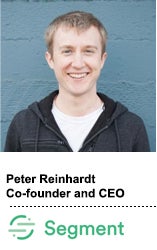 The mobile data platform Segment on Thursday announced a $64 million Series C round led by the Y Combinator Continuity Fund, an investment arm dedicated to the incubator’s alumni, and GV, Google’s venture capital group.
The mobile data platform Segment on Thursday announced a $64 million Series C round led by the Y Combinator Continuity Fund, an investment arm dedicated to the incubator’s alumni, and GV, Google’s venture capital group.
The investment brings Segment’s overall funding to $109 million. Its previous investors supported this round as well.
The money will go to expanding teams in sales, marketing and product, said co-founder and CEO Peter Reinhardt. The company employs about 160 people, and expects to double that number in the next 18 months.
“The number of tools in the mar tech ecosystem is exploding past 10,000,” he said. “A lot of the investor interest stems from seeing that and recognizing that if the ecosystem is doing that it’s going to need a hub for those pieces to play nicely together.”
Segment works with around 15,000 companies and developers, including 6,000 mobile apps. Only 4,000 of those users are paying customers.
DigitalOcean, a cloud infrastructure provider, used Segment to identify people with “compute-intensive workloads,” meaning they were straining their own data-hosting capabilities, for the launch of a product geared to ad exchanges, game servers and batch processors, said marketing VP Tom Berger.
“Segment is starting to see a network effect from the range of services they offer,” Berger said.
Segment is in a race to secure app and data integrations as a mobile solution for translating data across different sources becomes as ubiquitous as tag managers were on desktop, Reinhardt said.
Consider a company like Crashlytics, which has a similar model, but for crash reporting, he said.
“Most of the market is going to want one tool to be a standard they plug into every app,” Reinhardt said, “and it’s going to be the one that reaches that network inflection point where the aggregated benefits of the data they see make it a no-brainer.”
Segment is competing with mobile-first rivals like mParticle, desktop tag managers like Tealium and Ensighten that offer mobile products and cloud marketing suites to be the universal data translation toolkit.
Ali Rowghani, a Y Combinator partner and former Twitter COO, joined the board with the round.
“Segment is the market leader in its category,” Rowghani said. “With a substantial lead over the No. 2 player.”
Segment will look to cement its position by putting sales and marketing boots on the ground, having relied primarily on inbound requests and prospecting developer community hubs like The Hacker News or Quora.
The startup is also restructuring its real-time data aggregation to allow developers to build applications on top of it, as Salesforce does with its AppExchange product, Reinhardt said.
And as the company adds more enterprise customers, which typically pay an annual rate for unlimited integrations, product teams must expand to meet the accelerating number of client requests.
Segment may have cleared nine digits in funding, Reinhardt said, “but we’re small compared to the size of the ecosystem out there.”














